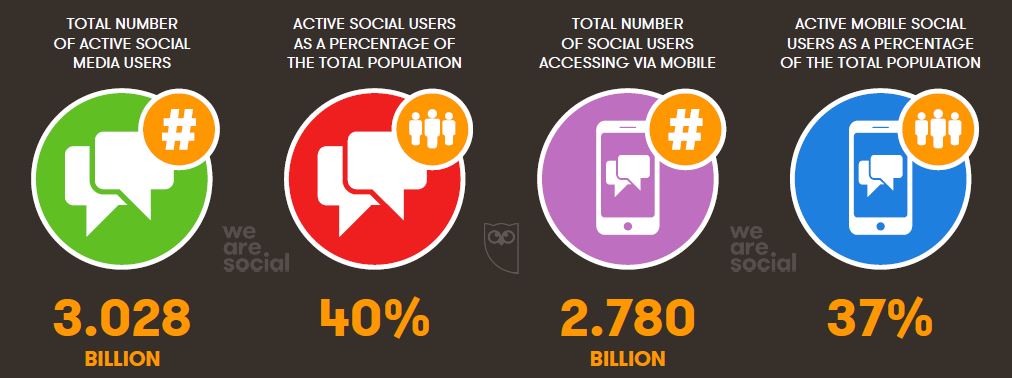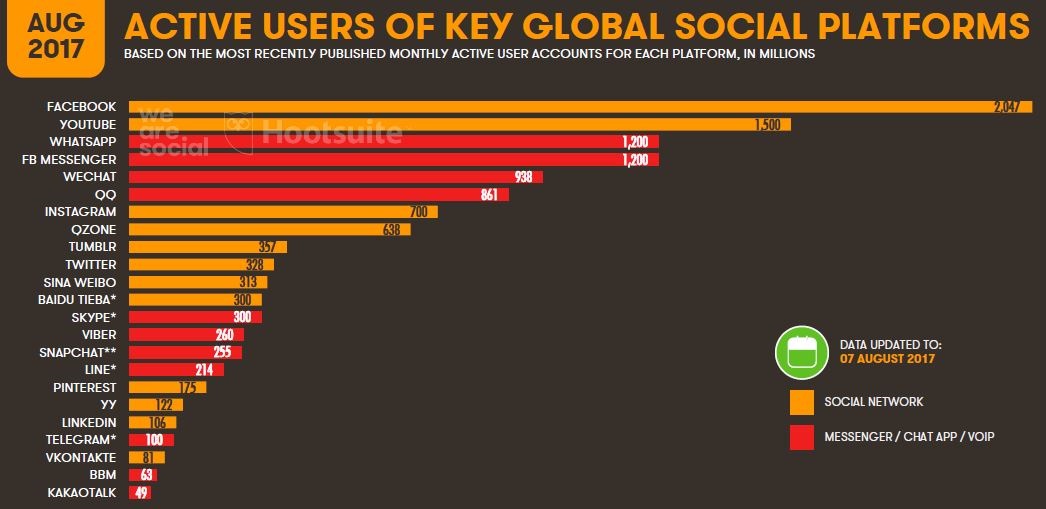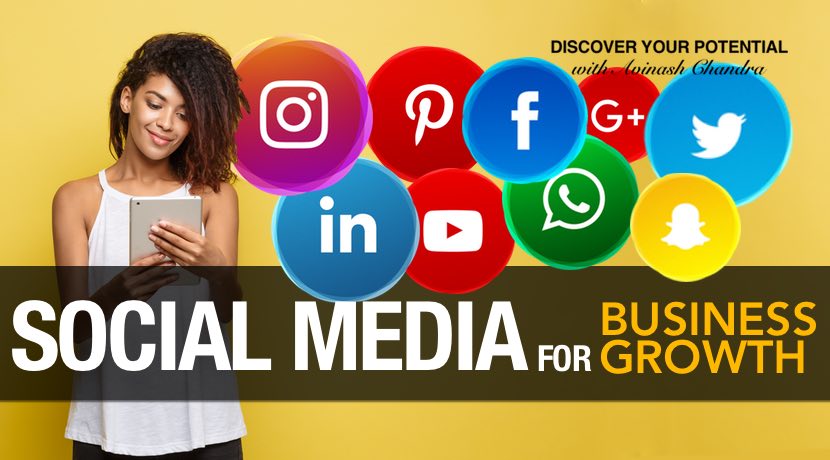Haven’t used social media yet? You must have been living under a rock!
Perhaps the most addictive and explored place that gives you an opportunity to express yourself to the world is Social Media. A place to get pouring unbiased and unfiltered thoughts/information/content from friends & strangers.
It won’t be wrong to say social media has redefined the way people interact with each other and has become something of a daily influence.
40% of the World Population is Using Social Media Today

While it has a tremendous impact on individuals, businesses nowadays are not far behind either.
Many companies that once considered social media an iffy place to venture into are now taking to the social route for marketing and advertising their products and services. After all it is the place where your probable customers are hanging out!
44% of local businesses use social media platforms to generate brand awareness, and 40% depend on it to drive revenue.(1)
Being able to target large audiences with low cost has made the social media viral for brand promotion activities.
8 million business profiles on Instagram and 5 million active advertisers on Facebook are the testimony of growing popularity of the use of social media for business.(2)
What is social media ?
The social media platforms were experiments started with a vision to connect the world over the internet and to facilitate smooth and reliable communication between people. The “social” part refers to interaction with other people, and the “media” refers to a web-based communication tool like the internet.
Social media is an Internet enabled platform that enables the exchange of information such as biographical data, personal photos/videos, professional information, and up-to-the-minute thoughts.
So essentially social media has now become a digital marketing tool.
Describing social media, in a nutshell, may not give you the perfect picture.
Now it is way more than just interacting with people over the web. It is one of the best resources of the internet to get great information shared by smart people around the world, all for free.
Facebook, Twitter, Instagram, Snapchat, Linkedin, Google Plus, YouTube, Pinterest are some of the more famous social media platforms with a large user base. Among all, Facebook is the biggest social media platform on the web and is considered the most influential and impactful for the success of any business(8).
What is a Social Network?
A Social Network is nothing but a type of Social media platform that allows its users to communicate with each other. Popular examples of Social networks are, once again, Facebook or Google Plus or Twitter or Linkedin. All these are social networks too.
Social networks are defined as a dedicated website or a mobile application or any other type of Tablet or desktop application that enables users to communicate with each other by posting information, comments, messages, images, etc.
So essentially Social Networks are a subset of Social media.
What is Social Networking?
As a process, social networking allows people to build social relations on a social media platform.
The common driver of these relationships used to be family connections. But now common interest or schooling or similar hobbies etc have become other means of connecting to like-minded people around the web.
Needless to say, Social networking is gaining popularity among businesses and marketers.
The primary objective of social networking – for businesses – is to increase brand awareness and engagement.
Social networks such as Facebook, Twitter, Linkedin, etc., allow marketers to connect with users in a non-intrusive setting and make the consumer more confident & comfortable about the entire interaction.
Types of Social Media Platforms
When it comes to social media, the names which come to our mind are quite a few:
However, these are only the most popular ones. There are many more social media sites out there. Several of these unheard names could be extremely valuable for your business. Therefore, it is a must that you explore them if you are bullish on this digital marketing strategy.
However, it will be impossible to choose one social media from hundreds of social networks for your business. To help you I am going to classify social media platforms into a few categories.
Below are the types of Social Media Platforms that will help you classify these networks and choose one for your business:
- Personalized Social networks such as Facebook, Twitter, Linkedin
- Media Sharing social networks such as Instagram, YouTube, Snapchat, Imgur
- Discussion Forums such as Reddit, Quora, Digg
- Bookmarking and content curation social networks such as Pinterest, StumbleUpon
- Consumer Review networks such as Yelp, TripAdvisor
- Blogging and publishing networks such as Tumblr, medium
- Interest Based social media platforms such as Houzz, Goodreads
- Social Shopping networks such as Etsy, Polyvore
- Sharing Economy social networks such as AirBnB, Ola, Uber
- Anonymous Social networks such as Whisper
Why Social Media is important for Businesses
Statistics suggest that 1 in every 5 minutes spent on the internet is on some kind of social media.
Facebook and Instagram together account for more than 2.7 billion users worldwide. With such a large number of people using social media, companies can’t afford to not interact with their potential customers over these platforms.
The broad reach, instant access, and viral nature of social media are some of the main reasons why more and more businesses are joining social media and leveraging them as a part of their overall marketing strategy.
Such is the impact of social media that even banks have started facilitating payment transfers via Facebook and other networking platforms(7). Budget is another important reason for small businesses to sail their ship through social platforms.
Social Media and its Impact on Buiness in numbers
Let’s have a look at some stats(3) that shows the ever-rising stature of social media and its impact on modern business:
- In the last two years, the social media ad spends worldwide has doubled from $16 billion in 2014 to $31 billion in 2016.
- Almost 90 % of marketers reported that the social marketing efforts had increased their business exposure, and 75 % confirms increased traffic on their business website.
- 64% of marketers use data from social media to optimize their marketing tactics.
- More than 1 in 3 Internet users admits that they go to social media/networks when searching for more information or reviews about a product or brand.
- More than 50 percent of marketers/advertisers, who have been using social media marketing for at least two years, have reported improved sales.
- 41% of marketers say social media campaigns help them achieve 10%-25% of their website traffic.
- Social media ad spending in the year 2017 accounts for 16% of global digital ad spending.
- In a marketing charts survey(4), Over 50% of B2B marketers rank social media platforms as a ‘very’ or ‘somewhat’ low-cost ad option.
Advantages and disadvantages of Social Media for businesses
The sudden rise in the social media space has drawn businesses to spend heavily on brand promotion and marketing through Facebook, Twitter, and other similar platforms.
While marketers are reaping rich rewards by implementing social media strategies, they should not get carried away with it. Like everything in the universe, social media has its own pros and cons. Let’s have a look at them.
Advantages of Social Media:
- Enables you to get more leads and potential customers with little or no cash investment.
- Generates online sales for your products and services by getting more traffic on your website.
- Reduces marketing cost with significant margin.
- Provides a quick and efficient way to contact consumers and get their feedback.
- Helps the potential customers who are surfing the internet to find your website faster.
- Assisting you in targeting the right audience by using geo-targeted specific criteria.
- Enables businesses to reach a large set of people in a short time.
- Provides greater access to international markets.
- Builds trusts and loyalty with customers and gives your business credibility. A study says people are more likely to spend money on a brand/ business which has an active Facebook page than one that doesn’t.
- Increases the visibility of your personal brand/business and improves ranking on search engines.
Disadvantages of Social Media:
- Takes significant time and effort to update your social media account on a regular basis.
- Needs a skilled resource to properly handle the social account of your business and manage online activities. So, it is not really free.
- Acrimonious customers can post negative comments which are most of the times NOT removable. Negative news spread faster than the good ones and can certainly spoil your brand reputation in no time.
- Online exposure of anything always attracts risks including information leaks and brand hijacking.
- The immediate nature of social media demands daily monitoring, and if you do not handle your social media page actively, you may lose the user base over time. This includes approving the new member requests and user posts, responding promptly to customer’s queries/suggestions, etc.
Impact of Social Media on business
Social media has transformed the communication and interaction of individuals throughout the world.
In recent times, social media has influenced many aspects of human communication, thereby impacting modern businesses.
Most of the traditional businesses were skeptical about putting their feet on social platforms. They mulled uncertainty and stayed away from it for quite a while.
It’s just been a few years since they have realized the power of social media and started investing in social campaigns and ads.
Let’s find out how social media helps a business grow.
Impact of Social media on Search Rank
Building your business presence on social networks is critical. The wild nature of social media gets your content circulated via free sharing by your brand followers and consumers.
Social media share is one of the more important criteria for Google and other search engines to determine the usefulness of content to the people. Therefore, the more your content gets shared, the better the search rank of your business.
Impact of Social media on Brand Awareness and Loyalty
Social media platforms like Facebook, Twitter, and Instagram represent a great opportunity for businesses to build a brand image.
Having a business profile such as a Facebook fan page and creative advertising via branded podcasts helps create brand awareness. It can also influence consumer preference and their willingness to pay a premium price for your brand.
Research also shows that brand storytelling, replying actively to an audience’s queries, and providing useful information/content to your followers improve brand loyalty.
Impact of Social media on Sales
71% of consumers say, they are more likely to buy a product based on social media referrals.
Sales are critical for the growth of any business. Establishing a healthy relationship and getting to know your customers are the key to any business to drive sales.
Social media has affected the purchasing decision of common people by providing direct access to brands. Especially the super savvy audience like to check the brand reviews and feedback before purchasing with them(8).
Reports suggest that creating and curating good content and stories have helped marketers to engage more potential customers.
Happy customers are more likely to share your content and give you positive feedback. Thereby increasing word of mouth and trust in the brand which ultimately leads to better ROI (returns on investment) for your campaigns.
Leveraging Social Media for your Businesses Growth
So you are planning to leverage social media for your business. Below are a few things you should keep in mind:
1 Choose the platform that best suits your business
Just because one social platform has a larger user base does not mean you should opt for it. Remember the thumb rule:
One size does not fit all in social media space.
You have to understand where your potential customers are sitting. It’s surely a waste of time to spend money on one social media when your customers are spending time on others.
For B2C marketing, Facebook, Instagram, Pinterest should be your best bet(5). However, if you cater to other businesses, a.k.a B2B then Linkedin and Twitter are better choices.
2 Understand your customer
This is the key to success for any business.
The social media profile of a business should facilitate the customer’s needs rather than your own personal interests. While you can always showcase your product features and services, it’s imperative to share something that your consumers actually value.
3 Build relationships and engage in conversations
Social media has dramatically changed the way brands, and consumers communications.
The more you converse with your customers, the better your relationship will be. It’s always a two-way journey. Listen to your customers and respect their views.
Try to be proactive in replying to their queries/comments even if it’s a negative one. Provide them something that they feel happy about and adds value to their life. You need to be patient as it takes time before you start getting the desired result.
While social media can provide an instant boost to your business growth, you should not get carried away with it.
4 Don’t rely heavily on automation
There are many social media automation tools to facilitate your needs. They really help you save time and resources, but you got to draw a line on how you use them.
Automation is a great way to accomplish certain tasks, but it can also water down your brand messaging. People prefer personalized messages. So, once they understand they are being fed content by a robot, they may lose faith in your brand.
5 Don’t spread junk
Whether it’s email or social media, nobody likes junk. Avoid circulating information that is not engaging any customer or not adding any value to their life.
People may lose interest over time and abandon your page. Instead, try to provide them with the information they really care about.
6 Never point fingers
There is no value in pointing fingers on social media(6). While you can always argue the appropriateness of your comments/reply, you will always end up on the losing side. It’s a lose-lose situation and makes your business look like the bad guy.
The irreversible impact that social media has made on the younger and to some extent the older generation is not going to slow down anytime soon.
Social media if used correctly is the most powerful tool to operate on for modern businesses. Just remember to treat your customers well – and they will do the rest.
Reader FAQ’s:
What is social media definition?
Social Media is defined as websites and applications that enable users to create and share content or to participate in conversation with one another in a group setting.
What are all the Social media Sites?
When it comes to social media, the names which come to our mind are just a few:
Facebook
Youtube
Twitter
Linkedin
Instagram
Google Plus
Quora
Flickr
Tumblr
PinterestWhich are the most popular Social Media Sites Right Now?
As per latest, We Are Social Report by Hootsuite, the most popular Social Media sites today are
Facebook (2 Billion users)
Youtube (1.5 Billion users)
Instagram (700 million users)
Qzone (638 million users)
Tumbler (357 million users)
Twitter (328 million users)
Sina Weibo (313 million users)
Baidu Tieba (300 million users)
Pinterest (175 million users)
YY (122 million users)
Linkedin (106 Million users)
Vkontakte (81 million users) MOST POPULAR SOCIAL MEDIA PLATFORMS IN THE WORLD(9)
MOST POPULAR SOCIAL MEDIA PLATFORMS IN THE WORLD(9)What is Social Media Platforms?
Social Media platforms are a tool (websites or apps) that enable users to create and share content or to participate in conversation with one another in a group setting.
What is meant by Social Networking?
Social networking is the use of social media platforms to stay connected on-demand with friends, family, classmates, customers, and clients.
What is Social Networking?
Social networking is the use of social media platforms to stay connected on-demand with friends, family, classmates, customers, and clients.
Social networks may happen for recreational, informational, or business purposes on social networks such as Facebook, Twitter, Linked In, etc.What are Social Networking Sites?
Social networking sites are those social media platforms that allow users to make a social structure with their friends, family, classmates, customers, and clients.
What are the advantages of Social Networking for Marketers?
Marketers use social networking to achieve their business and/or marketing objectives.
Social networking helps them connect with old, current, and future customers. Social networking helps them build brand awareness, engagement, and sales.
To meet these objectives marketers share recreational, informational, or transactional posts, images, videos, etc on social networks. Building a following provides access to and interaction with new, recent, and old customers. Sharing blog posts, images, videos, or comments on social media allows followers to react, visit the company’s website, and become customers.
Based on where these activities are taking place customers to engage with the input from marketers and take actions as per their wish.
Social networks allow marketers to engage with their audience in a non-intrusive manner, allowing them to make an informed decision.
Thus helping a marketer generate much better engagement with their customers.
References:
- Social Media Marketing Statistics Important to Small Businesses.
- Helping Small Businesses Succeed in a Mobile World
- 157 Stunning Social Media Stats to Savor, Vendasta
- How to Choose the Most Effective Social Media Platform for Your Brand, Brianna Smith, Social Media Today.
- Don’t Fight Flames With Flames. Social Media Arguments: Can’t-Win Propositions, New York Times
- Banks log on to social media networks for business, Times of India.
- Smart social media marketing drives millennial businesses, Economic Times of India
- Facebook is officially king of the apps: Social network was most popular app last year – and Android took the operating system crown from Apple, Daily Mail
- Digital in 2017. report by Hootsuite


Great insights! Social media is constantly evolving, and staying updated with the latest trends is crucial for success.